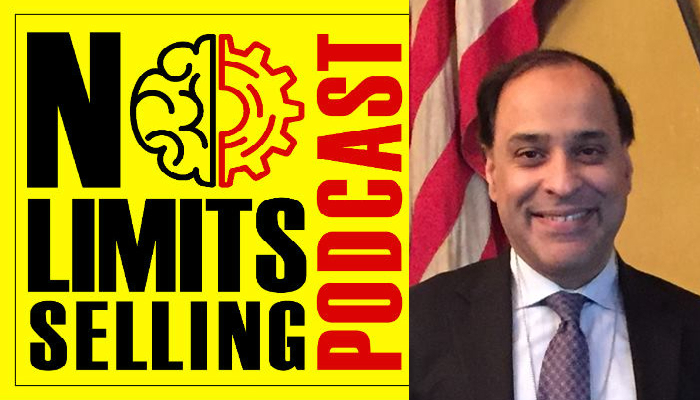The Importance of Cold Calling by Aakif Ahmad
On Episode 64 of The No Limits Selling Podcast, we have Aakif Ahmad, an entrepreneur and investor with 20+ years of professional experience leading teams and growing businesses. Zaphyre Business Services is a company he founded that provides, sales, marketing, and lead generation service to small and medium-sized companies in the B2B and B2C sectors.
Mclean Intelligent Workforce is a company he co-founded that provides companies around the world with recruiting services for IT, cybersecurity, engineering, operations, finance, sales, project and program management positions. He is also President of OPEN DC and premier Washington DC area not for profit that provides educational and networking services to a diverse community of CEOs, business owners, entrepreneurs, investors, and corporate professionals.
Aakif has spoken at organizations including TEDx Washington, D.C., Brookings Institution, Des Moines Committee on Foreign Relations and the Florida Network for Global Studies. Mr. Ahmad earned a B.A. from Yale University in Ethics, Politics and Economics, and M.B.A from the Kellogg School of Management.
Podcast Highlights:
- Cold calling works
- The sales process is your friend
- Believe in yourself

Contact Aakif:
#Coldcalling #gettingappointments #salestraining #nolimitsselling
[EDITOR’S NOTE: This podcast is sponsored by No Limits Selling. It is a fun, fast-paced podcast that delivers hard-fought business advice that you can implement today to improve your sales and performance]
Interested In Our Real Estate Coaching Services? Explore Our Website: Link
Feeling Not Well Today? You Can Use Our Mindset Boosters App To amp Up Your Mood: Link
Find us on Social Media:
LinkedIn | Facebook community | Instagram
Like what do you listen to? Subscribe to our podcast!
Ready to become fearless? We can help you become fearless in 60 days so you accomplish more in your career Schedule A 15 min Call with Umar
Summary
Introduction and Background
The podcast begins with the host, Umar Hameed, introducing Aakif Ahmad, the managing director of Zaphyre. They discuss the common belief that cold calling is dead, but Aakif disagrees, stating that it's still a viable method for reaching potential customers. He shares a story about Steve Richard, CEO of exact vision, who demonstrated the power of cold calling by landing an appointment during a live dial on stage.
The Importance of Cold Calling
Aakif emphasizes the importance of cold calling as a bridge to reach potential customers. He mentions that while marketing has become a dominant solution in recent years, cold calling remains a primary vehicle for reaching customers. He also shares his experience in building successful cold calling strategies.
The Process of Cold Calling
Aakif explains the process of cold calling, which involves developing introductory scripts, anticipating questions and objections, and designing responses. The goal of these scripts is to earn enough time from the person on the other end of the line to ask for an appointment. He also discusses the process of identifying the target market, researching and building a list of companies to approach, and finding the right individuals within those companies to contact.
Hiring and Training Sales Professionals
Aakif shares his approach to hiring sales professionals. He explains that there's no magic formula, but it involves interviewing a lot of interested individuals and evaluating them based on certain qualities. These qualities include a consistent goal-oriented focus, a competitive spirit, effective communication skills, and the ability to learn and adapt quickly. Once the right individual is hired, they are trained to handle the cold calling process effectively.
Conclusion
In conclusion, the podcast with Aakif Ahmad, the managing director of Zaphyre, provides valuable insights into the importance and process of cold calling in sales. Despite the common belief that cold calling is dead, Aakif argues that it remains a crucial method for reaching potential customers. He outlines the process of cold calling, which involves developing scripts, anticipating questions and objections, and identifying the target market.
Aakif also shares his approach to hiring and training sales professionals, emphasizing the importance of qualities such as goal-orientation, competitiveness, effective communication, and adaptability. The podcast serves as a comprehensive guide for anyone interested in enhancing their sales strategies and understanding the role of cold calling in business growth.
Questions & Answers
What is the role of cold calling in sales according to Aakif Ahmad?
How does Aakif Ahmad suggest developing a cold calling script?
What are the key qualities Aakif Ahmad looks for when hiring sales professionals?
How does Aakif Ahmad's approach to cold calling differ from traditional sales methods?
What are some key takeaways from Aakif Ahmad's podcast on cold calling?
Don’t miss this opportunity to transform your real estate career with one-on-one coaching. As an experienced real estate coach, I, Umar Hameed, am dedicated to helping you unlock your full potential and achieve your real estate goals. To learn more about who am I and my clients ↓
If you’re ready to take the next step, book an appointment with me today and begin your journey toward success in the real estate industry.
